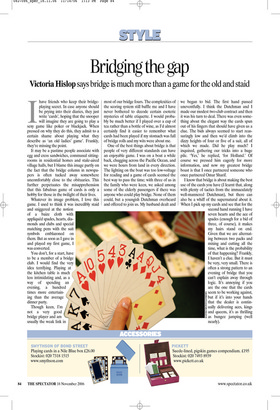Bridging the gap
Victoria Hislop says bridge is much more than a game for the old and staid Ihave friends who keep their bridgeplaying secret. In case anyone should be prying into their diaries, they just write ‘cards’, hoping that the snooper will imagine they are going to play a sexy game like poker or blackjack. When pressed on why they do this, they admit to a certain shame about playing what they describe as ‘an old ladies’ game’. Frankly, they’re missing the point.
It may be a pastime people associate with egg and cress sandwiches, communal sittingrooms in residential homes and stale-aired village halls, but I blame this image partly on the fact that the bridge column in newspapers is often tucked away somewhere uncomfortably close to the obituaries. This further perpetuates the misapprehension that this fabulous game of cards is only a hobby for those in the twilight of their lives.
Whatever its image problem, I love this game. I used to think it was incredibly staid and sniggered at the notion of a baize cloth with appliquéd spades, hearts, dia monds and clubs and special matching pens with the suit symbols emblazoned on them. But as soon as I gave in and played my first game, I was converted.
You don’t, for a start, have to be a member of a bridge club. I would find the very idea terrifying. Playing at the kitchen table is much less intimidating and, as a way of spending an evening, a hundred times more entertain ing than the average dinner party.
Though keen, I’m not a very good bridge player and am usually the weak link in most of our bridge fours. The complexities of the scoring system still baffle me and I have never bothered to decode certain esoteric mysteries of table etiquette. I would probably be much better if I played over a cup of tea rather than a bottle of wine, as I’d almost certainly find it easier to remember what cards had been played if my stomach was full of bridge rolls and my wits were about me.
One of the best things about bridge is that people of very different standards can have an enjoyable game. I was on a boat a while back, chugging across the Pacific Ocean, and we were hours from land in every direction. The lighting on the boat was too low-voltage for reading and a game of cards seemed the best way to pass the time; with three of us in the family who were keen, we asked among some of the elderly passengers if there was anyone who could play bridge. None of them could, but a youngish Dutchman overheard and offered to join us. My husband dealt and we began to bid. The first hand passed uneventfully. I think the Dutchman and I made our modest two-club contract and then it was his turn to deal. There was even something about the elegant way the cards spun out of his fingers that should have given us a clue. The bids always seemed to start reassuringly low and then we’d climb into the dizzy heights of four or five of a suit, all of which we made. Did he play much? I inquired, gathering our tricks into a huge pile. ‘Yes,’ he replied, ‘for Holland.’ Of course we pressed him eagerly for more information, and now my greatest bridge boast is that I once partnered someone who once partnered Omar Sharif.
I know that bridge is about making the best use of the cards you have (I learnt that, along with plenty of tactics from the immaculately well-mannered Dutchman), but there can also be a whiff of the supernatural about it. When I pick up my cards and see that for the second hand running I have seven hearts and the ace of spades (enough for a bid of three, of course), it makes my hairs stand on end. Given that we are alternating between two packs and mixing and cutting all the time, what is the probability of that happening? Frankly, I haven’t a clue. But it must be very, very small. There is often a strong pattern to an evening of bridge that you can’t explain away through logic. It’s annoying if you are the one that the cards seem to be working against, but if it’s into your hands that the dealer is continually delivering aces, kings and queens, it’s as thrilling as bungee jumping (well nearly).
DAVID MONTGOMERY


































































































 Previous page
Previous page